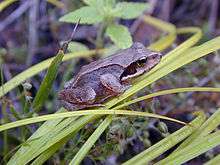Rana chensinensis
| Asiatic grass frog | |
|---|---|
 | |
| Scientific classification | |
| Kingdom: | Animalia |
| Phylum: | Chordata |
| Class: | Amphibia |
| Order: | Anura |
| Family: | Ranidae |
| Genus: | Rana |
| Species: | R. chensinensis |
| Binomial name | |
| Rana chensinensis David, 1875 | |
The Asiatic grass frog or Chinese brown frog (Rana chensinensis) is a species of frog in the Ranidae family, found in China and Mongolia.[2]
Its natural habitats are temperate forests, intermittent rivers, swamps, freshwater lakes, intermittent freshwater marshes, arable land, pastureland, and irrigated land. It is threatened by habitat loss.[1]
This frog is noted in Chinese agriculture for its strong preying performance on pests. A study conducted in Qingyuan County during the years 1982 and 1983 found that breeding the frogs decreased both the use of pesticides and the pollution in the environment.[3]
Within China, fatty tissue close to the frog's fallopian tubes are used to make Hasma, a dessert ingredient and traditional medicine.[4]
References
- 1 2 Sergius Kuzmin; Masafumi Matsui; Zhao Wenge; Vladimir Ishchenko; Natalia Ananjeva; Nikolai Orlov (2004). "Rana chensinensis". IUCN Red List of Threatened Species. Version 2013.2. International Union for Conservation of Nature. Retrieved 7 April 2014.
- ↑ Frost, Darrel R. (2014). "Rana chensinensis David, 1875". Amphibian Species of the World: an Online Reference. Version 6.0. American Museum of Natural History. Retrieved 7 April 2014.
- ↑ Li, Wenhua (2001). Agro-ecological Farming Systems in China. Taylor & Francis. pp. 195–6. ISBN 978-92-3-103784-9.
- ↑ Deutsch, Jonathan; Murakhver, Natalya (2012). They Eat That?: A Cultural Encyclopedia of Weird and Exotic Food from Around the World. ABC-CLIO. p. 75. ISBN 978-0-313-38058-7.
This article is issued from Wikipedia - version of the 11/6/2016. The text is available under the Creative Commons Attribution/Share Alike but additional terms may apply for the media files.
